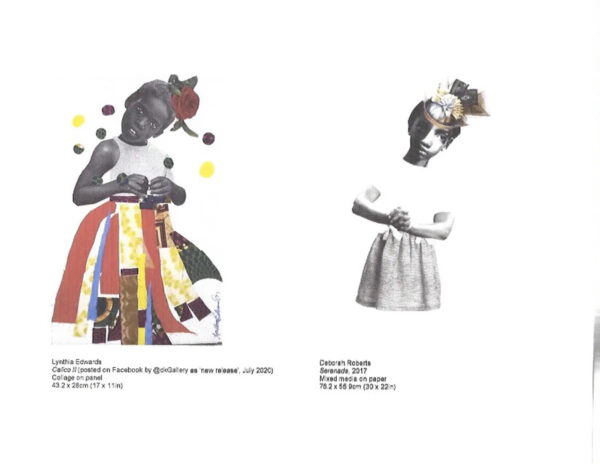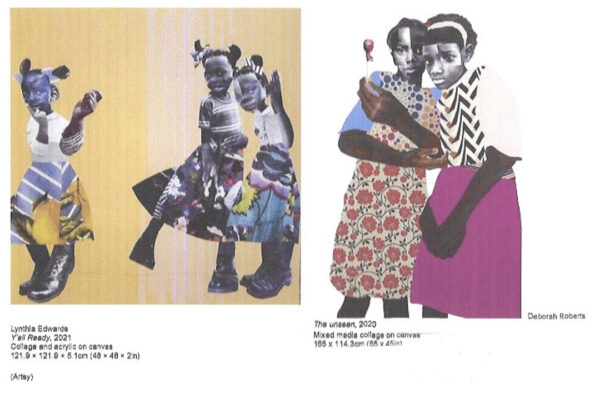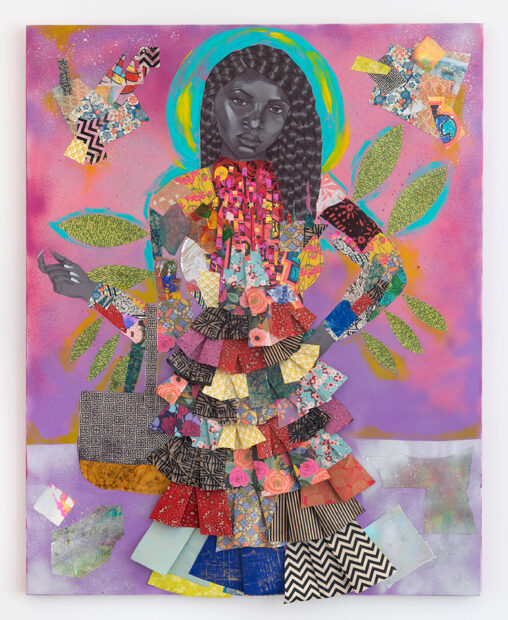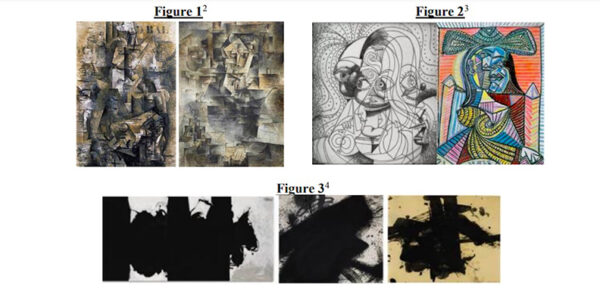In August 2022, Austin-based artist Deborah Roberts filed a copyright infringement lawsuit against Birmingham-based artist Lynthia Edwards, Ms. Edwards’ gallery (Richard Beavers Gallery), and gallerist Richard Beavers. Ms. Edwards has now filed a counterclaim asserting that Ms. Roberts’ lawsuit against her is defamation.

Works by Lynthia Edwards and Deborah Roberts, included in Ms. Roberts’ complaint filed in August 2022.
In the original lawsuit, Ms. Roberts accuses Ms. Edwards and the gallery of “willful copyright infringement.” As reported in ARTnews, Ms. Roberts says that Mr. Beavers contacted her in 2020 with an offer to sell her work in his gallery, stating, “so many of my clients have you on their wish list of artists whose work they would like to acquire for their collections.” Ms. Roberts asserts that after she declined this offer, Mr. Beavers and Ms. Edwards planned to copy Ms. Roberts’ collage style, which combines photographs and textiles to create compositions depicting Black children.

Works by Lynthia Edwards and Deborah Roberts, included in Ms. Roberts’ complaint filed in August 2022.
In February of 2023, Mr. Beavers and Ms. Edwards requested that the U.S. District Court, Eastern District of New York dismiss the lawsuit. According to Artnet News, the dismissal request claims that Ms. Roberts, who is a more established artist than Ms. Edwards, is attempting “to stifle market competition and eliminate a competitive threat.” It goes on to state that Ms. Roberts “did not invent and does not own the concept of depicting Black figures through collage.”

Jamea Richmond-Edwards, “Archetype of a 5 Star,” 2018, acrylic, spray paint, glitter, ink, and cut paper on canvas. Rubell Museum, Miami. © Jamea Richmond-Edwards
The concept of collage artworks depicting Black identity is currently the theme of a major exhibition on view at the Museum of Fine Arts, Houston. Multiplicity: Blackness in Contemporary American Collage was organized by the Frist Art Museum in Nashville, Tennessee and brings together works by 58 artists, including Mark Bradford, Lauren Halsey, Kerry James Marshall, Lorna Simpson, Jamal Cyrus, Rick Lowe, Tay Butler, and Deborah Roberts, among many others. It is striking that throughout the exhibition, while there are clearly ties between the artists’ work, none appear quite as closely aligned visually as the work of Ms. Roberts and Ms. Edwards, who is not part of the exhibition.
Mr. Beavers and Ms. Edwards’ call for dismissal of Ms. Roberts’ lawsuit includes visual comparisons between Pablo Picasso and Georges Braque and Franz Kline and Robert Motherwell, which are used to note the history of artists working in similar styles. However, the comparison between Picasso and Braque and Ms. Roberts and Ms. Edwards is different in that Picasso and Braque were working together, collaborating, and in dialogue in a direct and purposeful manner.

Images of works by Pablo Picasso, George Braque, Franz Kline, and Robert Motherwell, included in a complaint filed by Richard Beavers and Lynthia Edwards.
The countersuit contends that Ms. Edwards and Ms. Roberts came to work in a similar style independent of each other. It notes their shared influences such as Romare Bearden, an African American collage artist, and Hannah Höch, a German Dadaist known as one of the pioneers of photomontage. The filing notes that Ms. Roberts and Ms. Edwards began working in collage around the same time (between 2011 and 2014). The counterclaim also alleges Ms. Roberts and Stephen Friedman Gallery, which represents her, are engaged in a “campaign to destroy the reputations and livelihood” of Ms. Edwards and Mr. Beavers. Specifically, the filing purports that the gallery has attempted to stop sales of Ms. Edwards’ work and was successful in getting it removed from Platformart.com, an online art market run by the mega-gallery David Zwirner. As of this article, Ms. Edwards’ work Dancing Girls With Blue Nail Polish is still listed on the site.
For now, courts have not weighed in on the claims between Ms. Roberts and Ms. Edwards, so it is important to note that the information shared in the filings has not been substantiated. It is clear across time and geographic location that artists can and do develop similar styles independent of one another. Comparisons of artists working with similar ideas, visual language, and mediums are made through forums like Glasstire’s This and That series or the Instagram account @whos____who. While Ms. Roberts’ work is covered by copyright law, it seems that Ms. Edwards has not copied an entire work by Ms. Roberts. Though, according to a case review published by the Center for Art Law, Ms. Roberts’ attorney Richard Calrida argues that Ms. Edwards has “gone so far as to incorporate the same photographic source material that Ms. Roberts selected for inclusion (in her collages).” The question of whether or not Ms. Edwards’ work is copyright infringement may be difficult to determine, because despite the similarities between her work and Ms. Roberts’, it appears there is not a direct one-to-one use or copying of Ms. Roberts’ work.



3 comments
It’s essential to wait for the courts to weigh in with a legal perspective. This case could potentially set a precedent for how copyright law is interpreted in contemporary art, particularly within styles that involve the layering of various media and imagery.
This artist/gallery is delusional. As an educator if a student submitted this work it would absolutely earn a zero for plagiarism, unless of course it was a “master work copy” assignment, in which case they would earn a solid B.
I hope you are not an educator. The sued artist produced artworks imbued with her own creativity, of which I can not find any clear indication of plagiarism despite the accusation. You got a very vindictive mindset just like the suing artist. In this world, we human are influencing and inspiring each other with our works, knowledge and creativity, that is how humanity progresses. No one should use copyright law just because his/her works have inspired others to create something of similar style, unless that person is jealous, arrogant, and naive.
I hope the counter sue will teach her some very good lessons.